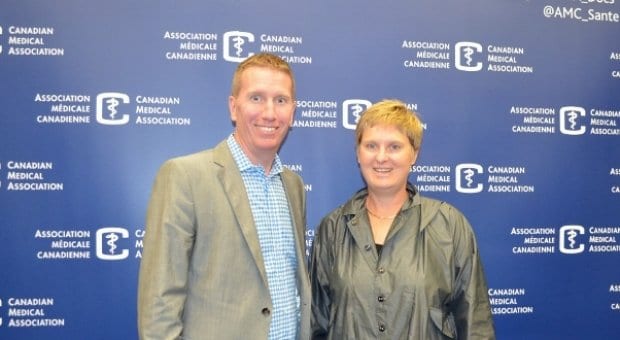The lesbian president of the Canadian Medical Association (CMA) says Canadians view equitable access to healthcare as the most pressing social determinant influencing the health of queer people.
Dr Anna Reid, joined by Normand Laberge, executive director of the Quebec Medical Association, and Fred Phelps, executive director of the Canadian Association of Social Workers, presented the CMA report “Health Care in Canada: What Makes Us Sick” at Ottawa’s Centretown Community Health Centre (CCHC), July 30.
The report stems from town-hall meetings staged from Calgary to St John’s between February and June, asking Canadians what they think affects their health.
First and foremost, poverty must be eliminated to improve the health of Canadians, all agree.
“Poverty kills,” Reid says, adding later that social and economic factors determine up to 50 percent of health outcomes.
“The Public Health Agency of Canada released a report last year saying that actually 20 percent of Canada’s healthcare costs are attributable to issues such as poverty, poor housing, et cetera,” Reid says. “So a full one in five dollars that we are spending on healthcare is attributable to these issues.”
Equitable access to healthcare among queer Canadians was also raised as a primary concern at one town hall, Reid says, but not in the context of poverty.
“It was raised in the context of how do marginalized populations access adequate care and actually be treated within the system in an equal way with respect. It was certainly identified at one town hall as a marginalized population that we are actually not providing adequate access for, and we’re really unaware of, a lot of the mental-health issues and other issues regarding that,” Reid says.
CCHC “has been very active in promoting good access and proper treatment of the community, and it certainly is an interest of mine, being myself a lesbian” she adds.
Jeff Morrison, the openly gay president of CCHC’s board of directors, says that when it comes to queer Canadians, the social determinants that affect them are unique.
“There are issues surrounding socialization, acceptance and a sense of community that are probably somewhat unique to the GLBT population. But I think the main message is the same: that those social aspects for GLBT are just as important a health issue as is any other medical or health-related issue out there. This report has a particular resonance, I would think, with the GLBT population,” Morrison says.
While many believe the stereotype that queer people enjoy higher-than-average income and are highly educated, social isolation is one determinant of health that can affect queer people regardless of their education and income, Morrison contends.
“Unfortunately, for a lot of GLBT people, issues of exclusion, acceptance, family and social cohesion are difficult. Suicide rates tend to be higher, particularly for GLBT youth. We need to fix those, we need to ensure inclusion, we need to ensure acceptance, and that’s as much a part of healthcare as is anything else.”
Morrison says the CMA’s findings demonstrate that CCHC is on the right track. The community-health-centre model is a blueprint the country’s healthcare system should aspire to implement, he believes.
“CHCs are often the poor cousins of the hospital sector, and yet, as today’s report pointed out, we can offer so many solutions. It’s a lot easier to keep a person healthy and well than it is to treat them in a hospital after. The CHCs, in providing that social determinant in advance, are reducing barriers to full social inclusion.”
Read the full CMA report.


 Why you can trust Xtra
Why you can trust Xtra


